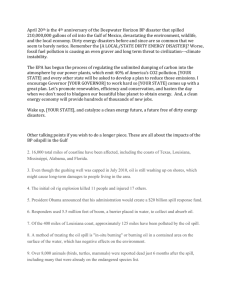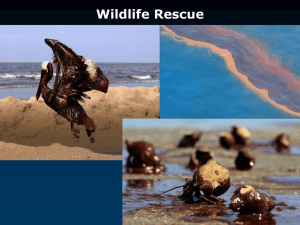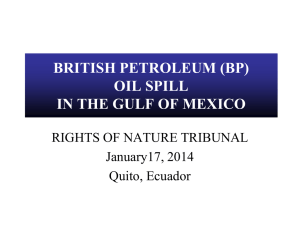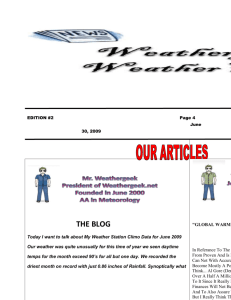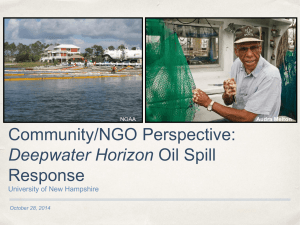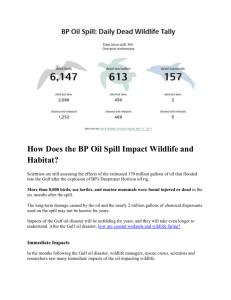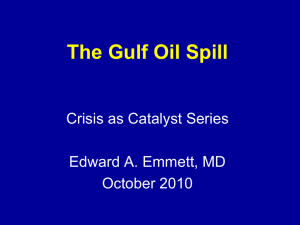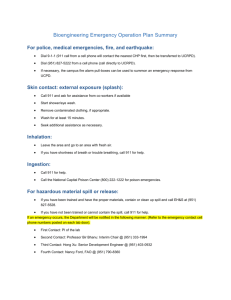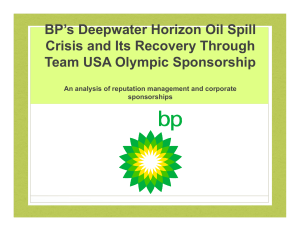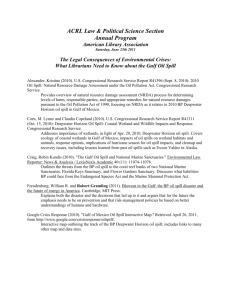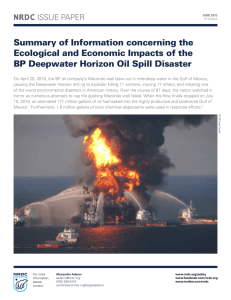What is the Goal of the University of Florida Study?
advertisement
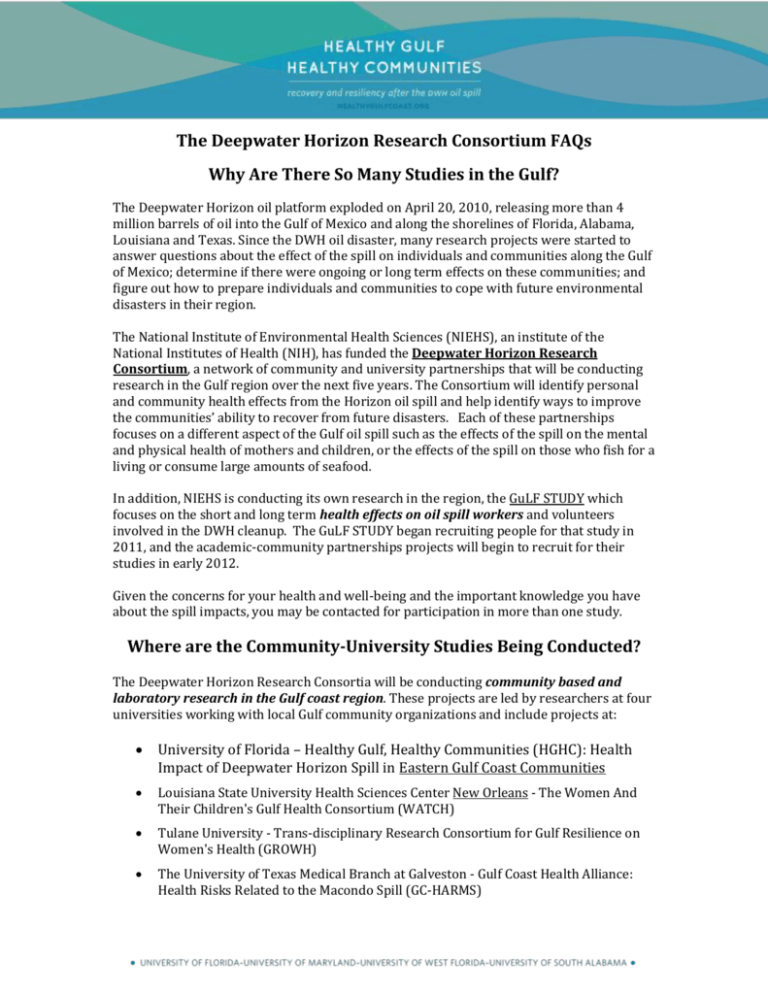
The Deepwater Horizon Research Consortium FAQs Why Are There So Many Studies in the Gulf? The Deepwater Horizon oil platform exploded on April 20, 2010, releasing more than 4 million barrels of oil into the Gulf of Mexico and along the shorelines of Florida, Alabama, Louisiana and Texas. Since the DWH oil disaster, many research projects were started to answer questions about the effect of the spill on individuals and communities along the Gulf of Mexico; determine if there were ongoing or long term effects on these communities; and figure out how to prepare individuals and communities to cope with future environmental disasters in their region. The National Institute of Environmental Health Sciences (NIEHS), an institute of the National Institutes of Health (NIH), has funded the Deepwater Horizon Research Consortium, a network of community and university partnerships that will be conducting research in the Gulf region over the next five years. The Consortium will identify personal and community health effects from the Horizon oil spill and help identify ways to improve the communities’ ability to recover from future disasters. Each of these partnerships focuses on a different aspect of the Gulf oil spill such as the effects of the spill on the mental and physical health of mothers and children, or the effects of the spill on those who fish for a living or consume large amounts of seafood. In addition, NIEHS is conducting its own research in the region, the GuLF STUDY which focuses on the short and long term health effects on oil spill workers and volunteers involved in the DWH cleanup. The GuLF STUDY began recruiting people for that study in 2011, and the academic-community partnerships projects will begin to recruit for their studies in early 2012. Given the concerns for your health and well-being and the important knowledge you have about the spill impacts, you may be contacted for participation in more than one study. Where are the Community-University Studies Being Conducted? The Deepwater Horizon Research Consortia will be conducting community based and laboratory research in the Gulf coast region. These projects are led by researchers at four universities working with local Gulf community organizations and include projects at: University of Florida – Healthy Gulf, Healthy Communities (HGHC): Health Impact of Deepwater Horizon Spill in Eastern Gulf Coast Communities Louisiana State University Health Sciences Center New Orleans - The Women And Their Children's Gulf Health Consortium (WATCH) Tulane University - Trans-disciplinary Research Consortium for Gulf Resilience on Women's Health (GROWH) The University of Texas Medical Branch at Galveston - Gulf Coast Health Alliance: Health Risks Related to the Macondo Spill (GC-HARMS) What is the Goal of the University of Florida Study? Health Impact of Deepwater Horizon (DWH) Spill in Eastern Gulf Coast Communities The objectives of the UF Healthy Gulf, Healthy Communities (HGHC) project are: To find out if the oil spill is affecting your state of mind and your mental health in the months after the spill To find out what has helped you cope after the oil spill To find out how the community is coping and who is most affected by the oil spill To find out if the chemicals from the oil spill are in the air, water and the seafood in your region To keep talking to the community and to let people in the community know what we are finding out in our study. It is our hope that these research findings can assist with the recovery process and help people in the community cope with any future environmental disasters. As part of our project, we will be contacting individuals and local community and faith based organizations to help us by providing information, samples of seafood caught in the region, and/or participating in outreach activities. In addition to our study, you may be contacted to participate in the others studies - this may include the GuLF Study (if you were an oil spill worker or helped with the clean-up efforts) or one of the other 3 funded projects in the Deepwater Horizon Research Consortia. To find out more information about the University of Florida project, go the project web site at: http://healthygulfcoast.org or contact Dr. John Glenn Morris at (352) 273-7526. We’ll be happy to answer any questions you may have. Our letterhead logo will be on all materials related to our study. University based personnel working on our project include the following: University of Florida: J. Glenn Morris jgmorris@epi.ufl.edu Brian Mayer bmayer@ufl.edu Andrew Kane kane@ufl.edu Tracy Irani irani@ufl.edu University of West Florida: Sam Mathews smathews@uwf.edu University of Maryland: Lynn Grattan lgrattan@som.umaryland.edu University of New Orleans Laura Scaramella lscarame@uno.edu University of South Alabama: James Connors jconnors@usouthal.edu
